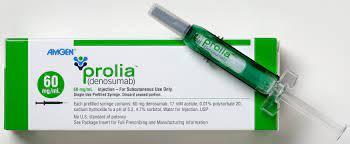Prolia Disease Interactions
There are 2 disease interactions with Prolia (denosumab).
Denosumab (applies to Prolia) hypocalcemia
Major Potential Hazard, Moderate plausibility. Applicable conditions: Hypoparathyroidism, Thyroid Disease, Renal Dysfunction
Preexisting hypocalcemia must be corrected prior to initiating treatment with denosumab. Caution should be exercised in patients predisposed to hypocalcemia and any disturbances of mineral metabolism, such as history of hypoparathyroidism, thyroid or parathyroid surgery, malabsorption syndromes, excision of small intestine, severe renal impairment or dialysis. Clinical monitoring of calcium and mineral levels (phosphorus and magnesium) are highly recommended within 14 days of denosumab injection. It is important to maintain calcium levels with adequate calcium and vitamin D supplementation.
Denosumab (applies to Prolia) immunosuppression
Moderate Potential Hazard, Moderate plausibility. Applicable conditions: Immunodeficiency
Denosumab should be used with caution in patients with impaired immune systems or taking concomitant immunosuppressant agents as they may be at increased risk for serious infections.
Switch to professional interaction data
Prolia drug interactions
There are 314 drug interactions with Prolia (denosumab).
More about Prolia (denosumab)
- Prolia consumer information
- Check interactions
- Compare alternatives
- Pricing & coupons
- Reviews (377)
- Drug images
- Latest FDA alerts (2)
- Side effects
- Dosage information
- Patient tips
- During pregnancy
- Support group
- FDA approval history
- Drug class: miscellaneous bone resorption inhibitors
- Breastfeeding
- En español
Related treatment guides
Drug Interaction Classification
| Highly clinically significant. Avoid combinations; the risk of the interaction outweighs the benefit. | |
| Moderately clinically significant. Usually avoid combinations; use it only under special circumstances. | |
| Minimally clinically significant. Minimize risk; assess risk and consider an alternative drug, take steps to circumvent the interaction risk and/or institute a monitoring plan. | |
| No interaction information available. |
See also:
Further information
Always consult your healthcare provider to ensure the information displayed on this page applies to your personal circumstances.


